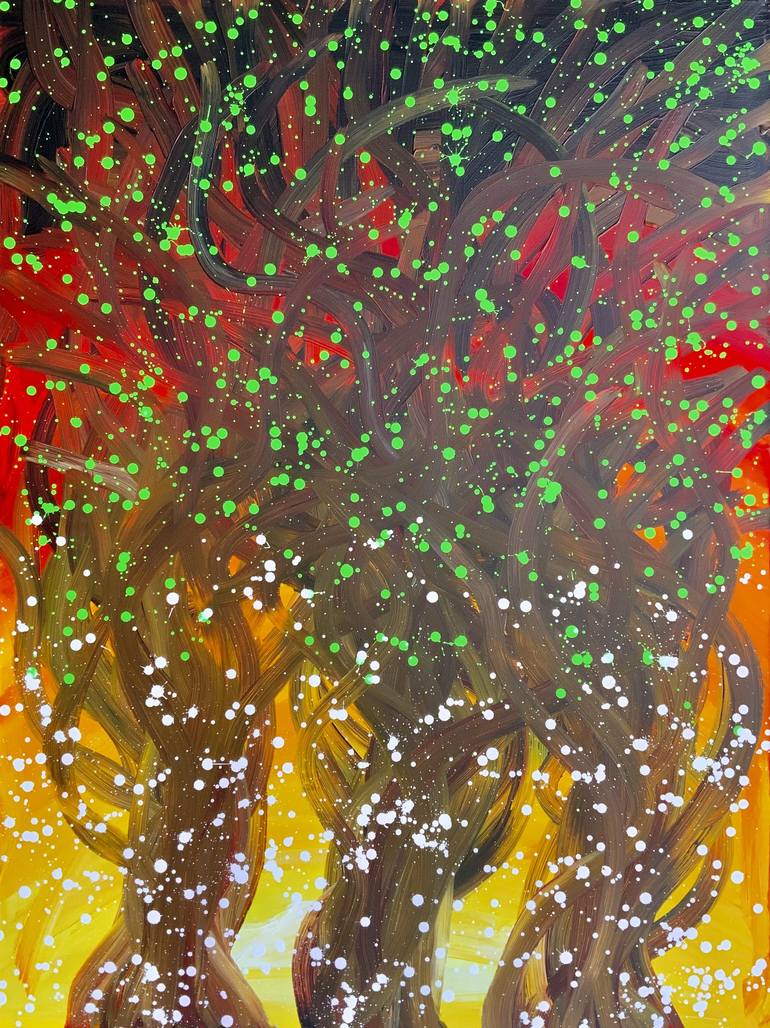







VIEW IN MY ROOM
Midnight in the Garden of Good and Eden Painting
Painting, Gouache on Canvas
Size: 36 W x 48 H x 0.5 D in
Ships in a Crate
Shipping included
14-day satisfaction guarantee
Artist Recognition

Artist featured in a collection
About The Artwork
The Garden of Eden (Hebrew: גַּן־עֵדֶן – gan-ʿḖḏen), also called the Terrestrial Paradise, or simply Paradise, is the biblical "Garden of God" described in the Book of Genesis and the Book of Ezekiel. Genesis 13:10 refers to the "garden of God", and the "trees of the garden" are mentioned in Ezekiel 31:9. The Book of Zechariah and the Book of Psalms also refer to trees and water, without explicitly mentioning Eden. The name derives from the Akkadian edinnu, from a Sumerian word edin meaning "plain" or "steppe", closely related to an Aramaic root word meaning "fruitful, well-watered". Another interpretation associates the name with a Hebrew word for "pleasure"; thus the Douay-Rheims Biblein Genesis 2:8 has the wording "And the Lord God had planted a paradise of pleasure", rather than "a garden in Eden". The Hebrew term is translated "pleasure" in Sarah's secret saying in Genesis 18:12. The location of Eden is described in the Book of Genesis as the source of four tributaries. Among scholars who consider it to have been real, there have been various suggestions for its location: at the head of the Persian Gulf, in southern Mesopotamia (now Iraq) where the Tigrisand Euphrates rivers run into the sea; and in Armenia. Like the Genesis flood narrative, the Genesis creation narrative and the account of the Tower of Babel, the story of Eden echoes the Mesopotamian myth of a king, as a primordial man, who is placed in a divine garden to guard the Tree of Life. The Hebrew Bible depicts Adam and Eve as walking around the Garden of Eden naked due to their sinlessness. The Garden of Eden is considered to be mythological by most scholars. Midnight in the Garden of Good and Evil is a non-fiction novel by John Berendt. The book, Berendt's first, was published in 1994 and follows the story of an antiques dealer on trial for the murder of a male prostitute. Subtitled A Savannah Story, with an initial printing of 25,000 copies, the book became a New York Times Best-Seller for 216 weeks following its debut and remains the longest-standing New York Times Best-Seller. The book was subsequently made into Clint Eastwood's 1997 film adaptation, with several characters' names changed to protect their privacy. Source: Wikipedia
Details & Dimensions
Painting:Gouache on Canvas
Original:One-of-a-kind Artwork
Size:36 W x 48 H x 0.5 D in
Frame:Not Framed
Ready to Hang:Not applicable
Packaging:Ships in a Crate
Shipping & Returns
Delivery Time:Typically 5-7 business days for domestic shipments, 10-14 business days for international shipments.
Handling:Ships in a wooden crate for additional protection of heavy or oversized artworks. Crated works are subject to an $80 care and handling fee. Artists are responsible for packaging and adhering to Saatchi Art’s packaging guidelines.
Ships From:United States.
Have additional questions?
Please visit our help section or contact us.
I’m (I am?) a self-taught artist, originally from the north suburbs of Chicago (also known as John Hughes' America). Born in 1984, I started painting in 2017 and began to take it somewhat seriously in 2019. I currently reside in rural Montana and live a secluded life with my three dogs - Pebbles (a.k.a. Jaws, Brandy, Fang), Bam Bam (a.k.a. Scrat, Dinki-Di, Trash Panda, Dug), and Mystique (a.k.a. Lady), and five cats - Burglekutt (a.k.a. Ghostmouse Makah), Vohnkar! (a.k.a. Storm Shadow, Grogu), Falkor (a.k.a. Moro, The Mummy's Kryptonite, Wendigo, BFC), Nibbler (a.k.a. Cobblepot), and Meegosh (a.k.a. Lenny). Part of the preface to the 'Complete Works of Emily Dickinson helps sum me up as a person and an artist: "The verses of Emily Dickinson belong emphatically to what Emerson long since called ‘the Poetry of the Portfolio,’ something produced absolutely without the thought of publication, and solely by way of expression of the writer's own mind. Such verse must inevitably forfeit whatever advantage lies in the discipline of public criticism and the enforced conformity to accepted ways. On the other hand, it may often gain something through the habit of freedom and unconventional utterance of daring thoughts. In the case of the present author, there was no choice in the matter; she must write thus, or not at all. A recluse by temperament and habit, literally spending years without settling her foot beyond the doorstep, and many more years during which her walks were strictly limited to her father's grounds, she habitually concealed her mind, like her person, from all but a few friends; and it was with great difficulty that she was persuaded to print during her lifetime, three or four poems. Yet she wrote verses in great abundance; and though brought curiosity indifferent to all conventional rules, had yet a rigorous literary standard of her own, and often altered a word many times to suit an ear which had its own tenacious fastidiousness." -Thomas Wentworth Higginson "Not bad... you say this is your first lesson?" "Yes, but my father was an *art collector*, so…"
Artist Recognition

Artist featured by Saatchi Art in a collection
Thousands Of Five-Star Reviews
We deliver world-class customer service to all of our art buyers.
Global Selection
Explore an unparalleled artwork selection by artists from around the world.
Satisfaction Guaranteed
Our 14-day satisfaction guarantee allows you to buy with confidence.
Support An Artist With Every Purchase
We pay our artists more on every sale than other galleries.
Need More Help?